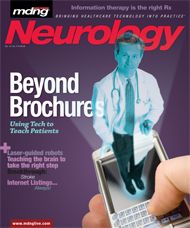Publication
Article
MDNG Neurology
TechSectors: Medical Device - Teaching the Brain to Take the Right Step
Can the application of chaos theory lead to better clinical rehabilitation and assistive devices for patients suffering from neuromuscular disorders?
Human behavior is much more variable than traditionally assumed, and it is precisely because of this variability that many new responses exist within the behavioral repertoire. Variability is inherent within all biological systems and recently has been linked to the health of biological systems. Functional neuromuscular variability can be described as the normal variations that occur in motor performance during multiple repetitions of a task. Today, it is known that variability might provide a healthy flexibility of the heart, brain, and other parts of the body. Conversely, many diseases are associated with a loss of this flexibility. As implied by its name, nonlinear dynamics is the study of systems, such as those in physiology in which output is not proportional to input, characterized by variability and chaos. The term “chaos” describes an apparently unpredictable behavior that may arise from internal feedback loops of nonlinear systems. A healthy brain processes motor commands in a chaotic manner, which allows for dynamic movements such as walking. In contrast, individuals with brain damage suffer from reduced brain processing capabilities and no longer have a dynamic gait.
Traditional rehabilitation treatment and training for individuals with motor disorders like stroke, traumatic brain injury (TBI), or cerebral palsy (CP) includes repetitive exercises of the musculoskeletal system, therapy for spasticity, and treatment that imitates normal movement patterns. With this conventional method, patients are unable to transfer motor functions learned in the clinic to real-life situations, resulting in slower recovery and less-than-adequate gait performance.
Based on the chaos theory, Step of Mind developed a non-invasive system that retrains the brain to process motor commands in a variable manner. The computer-controlled walking sandal (SoM-ToUR; Thrive on Unique Road) creates chaotic perturbations in the patient’s walk, records and analyzes walking patterns, and provides instantaneous feedback to the clinician. The solution challenges the patient by introducing variable environments that require an active response, forcing the patient to solve motor problems in real time. During the training session, the user will perform a series of tasks. At the same time, the shoe attachment will slightly change its position in one, or in a combination, of the following ways: forward or backward, left or right, and up or down.
The outcome: improved walking balance, posture, and motor behavior; quicker recovery time; and the ability to transfer and retain achievements learned in the clinic to natural environments. Two versions are in development: a professional rehab version for diagnostic and training purposes, and a basic home version. A multi-center, randomized, controlled study on children with CP in Israel, Jordan, and the Palestinian Authority, with funding from the USAID Middle East Research Cooperation and the United Cerebral Palsy Research and Educational Foundation, has been conducted. The results showed that using a variable motor learning approach signifi cantly improved rehabilitation for children diagnosed with CP. Another project—Self Mobility Improvement in the Elderly by Counteracting Falls—began in January 2008 and will include contributions from leaders from universities and other industries from Europe. The project is scheduled to last for 30 months; the anticipated outcome is an advanced prototype system to improve motor functions and mobility of elderly populations who are at an increased risk of falling. In June, clinical trials began to demonstrate the safety of the device in teenagers with CP and TBI.
Mr. Witkowski is the CEO at Step of Mind, which develops devices to assist patients with motor disorders. He can be contacted directly at wjacob@bezeqint.net.






